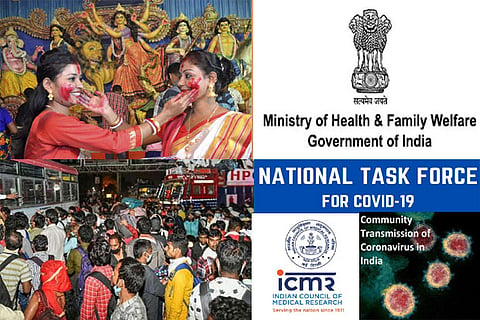

Chennai
It was, however, restricted to certain districts and states, the Minister added. His comments follow an admission by West Bengal Chief Minister Mamta Banerjee that community transmission had begun in the state where citizens have been advised to maintain caution, in the backdrop of the upcoming Durga Pooja festival. This week, the Calcutta High Court had designated pooja pandals as no-access zones for visitors, days before the celebrations were to begin.
Mass gatherings, a hallmark of such festivals, cannot be entertained at a time when the virus still has a vice-like grip on the nation. As of Thursday, India’s case-load had increased to 77.24 lakh while the number of active cases stood at 7.06 lakh, and the death toll at 1.16 lakh. On Tuesday, the country had reported a single-day rise of 46,790 new COVID cases, which happens to be the lowest single-day tally in as many as three months. Seven months into the lockdown, India’s recovery rate of 88.6 pc is being lauded by the Prime Minister as the result of circuit breakers employed in the early stages of COVID-19’s transmission.
Professor Giridhar Babu, an epidemiologist and a member of the National Task Force Research group, had said last month that community transmission might have occurred in containment zones of metros in May itself. In July, the Ministry of Health and Family Welfare had unwittingly revealed that community transmission might have taken place in India, from as early as April, immediately after the nation went into lockdown. The guidance document that noted this, was subsequently withdrawn from the Ministry’s website.
The Ministry’s denial seems baffling when in July, India was averaging more than 22,000 new COVID cases every day, at a growth rate of 3.5%. Other countries with similar growth that parroted India’s stance included Pakistan, Russia, Saudi Arabia, Kuwait, and Egypt. This is in contrast to Germany and Spain, who in that month, had reported over 2 lakh cases each, but chose to say that they were experiencing or local transmission. As many as 16 nations, where the daily average of new cases exceeded 1,000 cases over a week in July, classified outbreaks as being in the community transmission stage. They include the US, Brazil, South Africa and Bangladesh.
WHO in April had begun permitting nations to classify their stages of transmission while introducing a new stage called cluster of cases, i.e. cases clustered by time, geography or exposure. Since then, India, along with a few other nations with high case-loads opted for that terminology. But, stakeholders in healthcare said the Centre’s honest acknowledgment early on would have gone a long way in strengthening the trust citizens could have placed with the government, eliminating ambiguity regarding the spread. While quarantining and lockdown have been instrumental in controlling the pandemic, behavioural changes on the part of the community about masking as well as a stronger focus on hand hygiene and social distancing still leave a lot to be desired.
Last week, a government-appointed panel in charge of The COVID-19 India National Supermodel has offered a carefully-worded assurance, saying that the pandemic has already peaked in India in September and could be brought under control by February 2021. The team also said that by that time, the total number of COVID cases could hit 1.06 crore in India and has warned that lowering the guard during the festive season, and the upcoming winter season could result in as many as 26 lakh infections in a month. Amidst all the anxiety-inducing statistics, one thing is clear - it’s the cause that is killing us and not the classification. And whether COVID has peaked or not, the coming few months could determine the course of our lives.
Visit news.dtnext.in to explore our interactive epaper!
Download the DT Next app for more exciting features!
Click here for iOS
Click here for Android